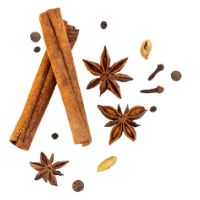Pommeau is a wonderful specialty from Normandy. It is a drink made 100% from apples. Comte Louis de Lauriston takes ¾ fresh, sweet apple juice and adds ¼ freshly distilled Calvados, so that the total alcohol volume lands at 17% and no sugar can ferment. All the sugar from the apples is thus intact and makes the drink pleasantly sweet. As a type, it is therefore reminiscent of Cognac’s Pineau de Charantes, but is of course made from apples and not grapes. The law requires Pommeau to be aged in oak casks for 14 months before release, but that is not good enough for Comte Louis de Lauriston, who age their Pommeau for 3-4 years. This, together with the complexity contributed by the producer’s more than 50 different apple varieties, makes for a formidable Pommeau.
Colour: Deep amber gold.
Aroma: Intense aroma of fresh and ripe apples, a little additional fresh fruit above citrus and warm, spicy notes from barrel ageing. The aroma is reminiscent of a younger Calvados.
Taste: The intense apple character continues in the taste, which is rounder and fuller than its spirit counterpart. Rounder due to the lower alcohol content and fuller due to the higher sugar content. The drink is sweet without being sticky or cloying. Delicious drink!
Gastronomic: Best enjoyed cellar cool (8-10 degrees) as an aperitif, as a light digestif or as a dessert wine for lighter desserts. Is really good for apple pies and in particular for a good, old-fashioned Danish apple cake with whipped cream and jelly. Can also be used in cocktails according to your own imagination, for example in an Apple Kir Royal mixed with Champagne.
The Calvados brand Comte Louis de Lauriston was founded to put an end to illegal distillation in the Domfront region of Normandy. The story is both interesting… and very, very French. Domfront’s hilly and wooded landscape is made for shady distillation, and if you were clever, you could easily evade the customs officer. For many years, the apple brandy was illegally produced in the dead of night, but one fateful day in 1962, a group of overzealous officers braved the night’s blizzard and caught a large group of distillers and calva smugglers red-handed. Before an hour had passed, a good dozen neighbors had arrived at the scene of the crime, for word had spread quickly, and the customs officers were not popular in Domfront. The poor customs officers were cornered, blinded by the headlights of the furious farmers’ tractors and Citroën 2CVs. One of those present feared that the situation would escalate out of control, and he sent for the general secretary of the local farmers’ union, the good Comte Louis de Lauriston. Count Lauriston was a reasonable man, and after a long negotiation, it was decided that the customs officers should drop the charges on condition that a cellar was built as an official warehouse, where the calvados could be stored and sold in accordance with the law. Count Lauriston himself undertook the task, and the warehouse was named Chais du Verger Normand.
Since 1962, local farmers have supplied calvados to Chais du Verger Normand, from where it was sold under the Comte Louis de Lauriston brand. Even today, you have old vintage Calvados from the time when it was created under the cover of darkness. Since 1992, the brand has belonged to another well-known Calvados house, Christian Drouin.
Since Comte Louis de Lauriston belongs to the Calvados Domfrontais appellation, it must contain a minimum of 30% pears, which gives it a very special character. The juice ferments in large, open wooden vats over several months, and the distillation takes place in a column still. The storage still takes place in the cellar from 1962, where the spirit is stored in old, well-used casks, which do not overpower the fine apple and pear fruit.


